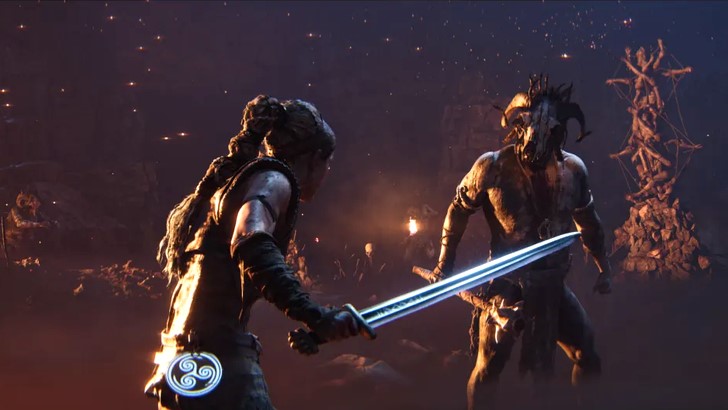Senua's Saga: Hellblade II gameplay. (Ninja Theory/Contributed)
Senua's Saga: Hellblade II is a strange game. It has some of the best and most realistic visuals in modern gaming, an intriguing storyline, and is also a step back from the original, making it one of the most mixed experiences for me.
Senua is a Pictish woman with severe mental illness and deep-rooted trauma. After the events of the first game, she seeks to attack the root of the tragedy that drove her further into madness. When Viking raiders kill Senua's partner, Dillion, she learns that they are also taking slaves back to the North. Emboldened, she allows herself to be taken as a slave in order to free the other prisoners and end the terrible cycle.
The setting of 9th century Iceland is perfect for a brutal tale of violence and horror, and Ninja Theory has created one of the most realistic settings ever put into a game. Norse mythology is a big part of the story, though the references are not as plentiful or interesting as in the first game.
The game is beautiful, but its linearity often makes it feel like you're playing on rails. The largest space players can explore is when there are puzzles, but even then the segments are short-lived. There's a bit more variety in the puzzles this time around, but I wish the combat had seen more improvements.
Sword fighting takes a step back in the sequel; the first game struggled to make fights with multiple enemies feel natural, leading to many combat segments dragging on. Hellblade II doesn't address these issues as much, cutting combat down to only one-on-one fights.
The presentation of combat has been changed to make it feel more like a scene from a movie where the protagonist is in the middle of a massive brawl, taking down random bad guys one by one. This is an interesting twist that feels dramatic at first, but the fact that it's the only form of combat in the game makes it limiting. It's surprising that the developers decided to do this with combat after such a long time has passed between games.
Whereas the first game focused on Senua's trauma and struggle to maintain her sanity, here the focus is on her difficulty bonding with others. Her inner voice is unrelenting, showcasing the constant doubt that those with mental illnesses have. The way the developers portrayed mental illness was mixed in the first game, and there's less of an emphasis on it in the sequel, which is ultimately a good thing.
An emerging theme in the story is the powerful effects of compassion and empathy. Senua's suffering has given her a unique perspective on life; different perspectives are a central theme in the series. As a result, she is able to understand the pain of others and use it to resolve conflicts. It's a nice touch to the story, but it doesn't translate into compelling gameplay.
Hellblade II is a beautiful game with great sound design and voice performances. It's also a game with very little interactivity, a step back from a game that already felt dated. Just when you think things are starting to get exciting, the game feels rushed towards the end, making the overall experience feel half-baked. Even great visuals prove to have their limitations. I give this game 3 out of 5 stars.


